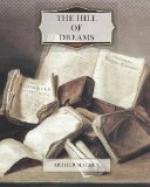Nobody called out “Here’s your master with Master Lucian; you can get tea ready,” when the pony jogged up to the front door. His mother had been dead a year, and a cousin kept house. She was a respectable person called Deacon, of middle age, and ordinary standards; and, consequently, there was cold mutton on the table. There was a cake, but nothing of flour, baked in ovens, would rise at Miss Deacon’s evocation. Still, the meal was laid in the beloved “parlor,” with the view of hills and valleys and climbing woods from the open window, and the old furniture was still pleasant to see, and the old books in the shelves had many memories. One of the most respected of the armchairs had become weak in the castors and had to be artfully propped up, but Lucian found it very comfortable after the hard forms. When tea was over he went out and strolled in the garden and orchards, and looked over the stile down into the brake, where foxgloves and bracken and broom mingled with the hazel undergrowth, where he knew of secret glades and untracked recesses, deep in the woven green, the cabinets for many years of his lonely meditations. Every path about his home, every field and hedgerow had dear and friendly memories for him; and the odor of the meadowsweet was better than the incense steaming in the sunshine. He loitered, and hung over the stile till the far-off woods began to turn purple, till the white mists were wreathing in the valley.
Day after day, through all that August, morning and evening were wrapped in haze; day after day the earth shimmered in the heat, and the air was strange, unfamiliar. As he wandered in the lanes and sauntered by the cool sweet verge of the woods, he saw and felt that nothing was common or accustomed, for the sunlight transfigured the meadows and changed all the form of the earth. Under the violent Provencal sun, the elms and beeches looked exotic trees, and in the early morning, when the mists were thick, the hills had put on an unearthly shape.
The one adventure of the holidays was the visit to the Roman fort, to that fantastic hill about whose steep bastions and haggard oaks he had seen the flames of sunset writhing nearly three years before. Ever since that Saturday evening in January, the lonely valley had been a desirable place to him; he had watched the green battlements in summer and winter weather, had seen the heaped mounds rising dimly amidst the drifting rain, had marked the violent height swim up from the ice-white bulwarks glimmer and vanish in hovering April twilight. In the hedge of the lane there was a gate on which he used to lean and look down south to where the hill surged up so suddenly, its summit defined on summer evenings not only by the rounded ramparts but by the ring of dense green foliage that marked the circle of oak trees. Higher up the lane, on the way he had come that Saturday afternoon, one could see the white walls of Morgan’s farm on the hillside to the north, and on the south there was the stile with the view of old Mrs. Gibbon’s cottage smoke; but down in the hollow, looking over the gate, there was no hint of human work, except those green and antique battlements, on which the oaks stood in circle, guarding the inner wood.




